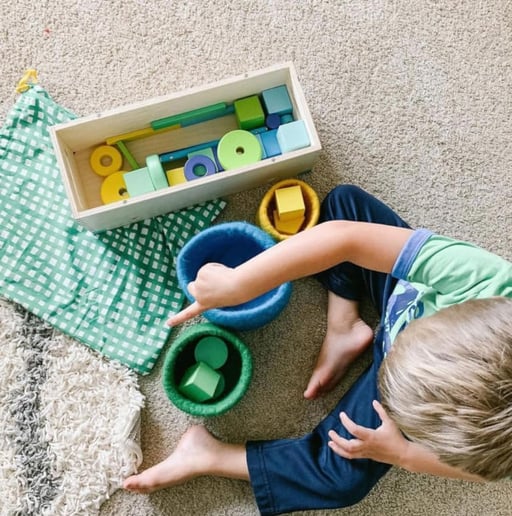Early math skills are foundational for your child’s future learning. Introducing these concepts in a fun and engaging way can create a love for learning and exploration that lasts a lifetime.
The Lovevery Block Kit is a fantastic tool that can help you introduce and support early math concepts for your two-year-old. Here’s how you can use this versatile kit to foster your little one’s mathematical development.
How to Support Early Math Concepts for Your Two-Year-Old
- Counting and Quantity

Start simple by counting blocks together. Lay out a few blocks and count them out loud with your child.
Show them how to touch each block as you count it to reinforce the idea that each number corresponds to a specific quantity.
Activity: Counting Blocks
Interactive Play:
Ask your child to hand you a certain number of blocks.
Play a game where you count blocks into a container, emphasizing the numbers as you go along.
- Recognizing Numbers
Use the number cards to help your child recognize numbers. Place the cards in front of them and ask them to match the correct number of blocks to each card. For example, place the card with the number 3 on it and help your child count out three blocks to match.
Activity: Number Matching Math Skills
Interactive Play:
Create a number line using the blocks and number cards, helping your child to arrange them in order.
Related article: Montessori Materials – Making Learning Fun and Engaging!
Play a game of “What’s Missing?” by removing a block from a sequence and asking your child to identify which number is missing.
- Understanding Shapes
What You Need: Lovevery Block Kit’s Shape Blocks
The Lovevery Block Kit includes blocks of different shapes. Encourage your child to sort these shapes into groups and name them. This activity helps in recognizing and differentiating between shapes, which is a fundamental math skill.

Activity: Shape Sorting
Interactive Play:
Create simple patterns using different shapes and ask your child to replicate them.
Hide a shape behind your back and describe it to your child, asking them to guess which shape it is.
- Building Spatial Awareness

Building towers with blocks is not only fun but also helps your child develop spatial awareness.
As they stack blocks, they understand concepts like balance, height and stability.
Activity: Tower Building
Interactive Play:
Challenge your child to build a tower as high as they can without it falling.
Related article: Creative Little Minds – features of the Lovevery Block Set
Use the blocks to create simple structures and ask your child to count the blocks used.
- Introduction to Patterns
Create simple patterns using the colorful blocks and encourage your child to continue the pattern.
For example, lay out a sequence like red block, blue block, red block, and ask your child to find the next block in the pattern.

Activity: Pattern Creation
Interactive Play:
Use different colors or shapes to create more complex patterns as your child becomes more skilled.
Turn it into a guessing game where you start a pattern and your child has to guess what comes next.
- Sorting and Categorizing

The different colored blocks in the Lovevery Block Kit are perfect for sorting activities. Ask your child to sort the blocks by color and count how many blocks are in each group.
Activity: Color Sorting
Interactive Play:
Mix up the blocks and ask your child to sort them as quickly as they can.
Create a “block store” where your child sorts and “sells” blocks of different colors.
Conclusion
Using the Lovevery Block Kit to introduce early math concepts to your two-year-old can set a strong foundation for their future learning.

Skills
These activities not only make math fun but also help develop critical thinking, problem-solving and fine motor skills.
Remember to keep the activities light and playful, allowing your child to explore and learn at their own pace.
Enjoy the journey of discovering numbers, shapes, and patterns together!
Related article: Wonders of Primary Teaching Manuals
We hope this podcast helps you support your child’s early math development in an engaging and playful way!



